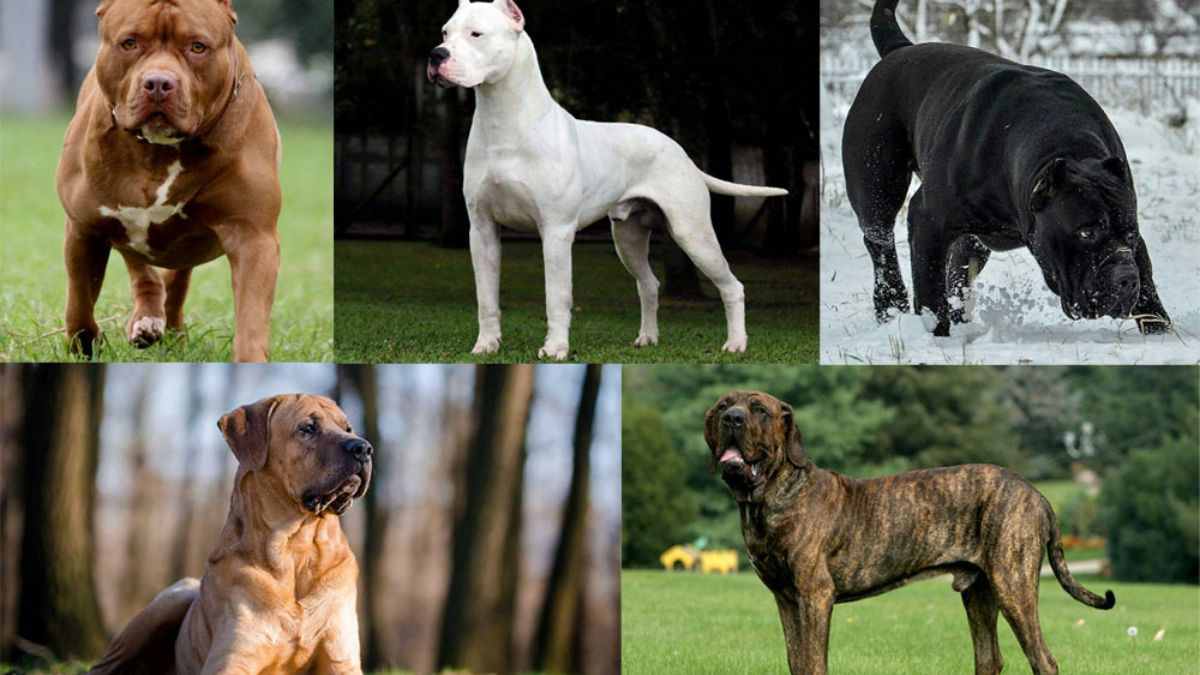Pit bulls, Rottweilers, and wolf hybrids are some dog breeds that are illegal in the United States. In the United States, there are certain dog breeds that are considered illegal due to their potential aggressiveness and harm they can cause.
Among these breeds are pit bulls, Rottweilers, and wolf hybrids, which are not permitted in many states and cities. These breeds are often classified as dangerous or high-risk dogs due to their strong jaws, muscular build, and protective instincts. While some arguments suggest that it is the owner’s responsibility to properly train and socialize these dogs, others believe that certain breeds pose inherent risks and should be banned altogether.
The controversy surrounding the legality of these breeds continues, with some jurisdictions implementing strict breed-specific legislation to address public safety concerns. However, it is worth noting that laws and regulations regarding dog breeds vary across different states and localities within the United States.
Understanding Dog Breed Bans
Certain dog breeds are banned in the USA due to breed-specific legislation (BSL). The objective of BSL is to prevent dog attacks and protect public safety. However, there is controversy surrounding these breed bans. Critics argue that breed-specific legislation is unfair and ineffective.
They believe that focusing on individual dog behavior and owner responsibility would be more effective in reducing dog attacks. The debate continues on whether breed-specific legislation is a necessary precaution or an infringement on dog owners’ rights. Ultimately, the goal is to strike a balance between public safety and respecting the rights of responsible dog owners.
Banned Breeds And Their Characteristics
Banned breeds in the USA include pit bulls, which are often misunderstood due to their history and misconceptions. American Staffordshire terriers, also known as pit bull terriers, have similar characteristics but differ in terms of breed standards. Rottweilers face stereotypes because of their size and strength, but their temperament and behavior can be managed with responsible ownership.
Wolf hybrids are another challenging breed due to their wild instincts and the controversies surrounding their legality. To ensure safety and prevent incidents, it is important to understand the unique requirements of owning such breeds and comply with legal restrictions.
By educating ourselves about these banned breeds and promoting responsible ownership, we can create a safer environment for both humans and our furry friends.
Other Banned Dog Breeds In The Usa
Dobermans, once-feared guard dogs, have evolved in terms of temperament and reputation. Training and socialization are crucial for Dobermans. Chow Chows, bear-like canines, have specific temperament traits and considerations for ownership. Healthcare needs for these breeds carry responsibilities. The Argentine Dogo is a versatile hunting dog with a unique history and popularity.
Controversies and restrictions surround owning a Dogo. These banned dog breeds in the USA require careful understanding and responsible ownership.
Impact Of Banned Breeds: Stats And Studies
Banned dog breeds in the USA have sparked debates and concerns. Data analysis offers insight into their impact. Research explores alternative solutions, prioritizing public safety. Discrimination based on breed affects the human-dog bond negatively. Emotional support and therapy dogs are also affected by breed restrictions.
Education and training play a crucial role in preventing incidents and promoting responsible ownership. By examining statistics and studying various approaches, policymakers can make informed decisions to ensure the safety and well-being of both humans and dogs. Understanding the complexities of breed bans will help create a more inclusive and effective approach to dog regulation and public safety.
Navigating Breed Bans And Responsible Ownership
Navigating breed bans and responsible ownership is crucial for dog lovers in the United States. With state-to-state variations in breed restrictions, it is important to understand local laws and regulations. Researching breed-specific legislation can be made easier with available resources.
Regardless of breed, responsible ownership practices should be followed diligently. Early socialization and obedience training play a crucial role in ensuring well-behaved dogs. Additionally, spaying/neutering and regular veterinary care are essential for the overall health and well-being of all breeds.
It is essential for dog owners to be aware of these factors to ensure a safe and enjoyable experience for both dogs and communities.
Conclusion: Shifting The Focus To Responsible Ownership
Education and awareness play a vital role in reevaluating breed-specific legislation. Promoting responsible dog ownership is crucial for a safer future. By focusing on educating individuals, we can shift the spotlight from the legality of certain breeds to responsible ownership.
Encouraging pet owners to understand the specific needs and temperament of their dogs helps prevent incidents. Moreover, promoting proper training and socialization can enhance public safety while ensuring a loving and harmonious bond between dog and owner. By prioritizing responsible ownership, we can change the narrative and create a positive impact on dog communities across the United States.
With a focus on education, awareness, and responsible ownership, we can build a safer and more compassionate environment for all dogs and their owners.

Credit: petolog.com
Conclusion
Understanding which dog breeds are illegal in the USA is an important consideration for both potential dog owners and those who already have a furry companion. It is crucial to be aware of the laws and regulations in your specific state and locality to ensure that you are in compliance.
While some may view breed-specific legislation as controversial, it is ultimately in place to protect the safety and well-being of both people and animals. By staying informed and responsible, we can create a society where all dogs, regardless of breed, can be loved and cared for in a safe environment.
Remember, responsible dog ownership is not only about the breed, but also about proper training, socialization, and care. So whether you have a dog that falls under the restricted category or not, love and cherish your four-legged friend with all your heart and embrace the joy they bring to your life.
Together, we can create a world where all dogs are treasured and loved.
